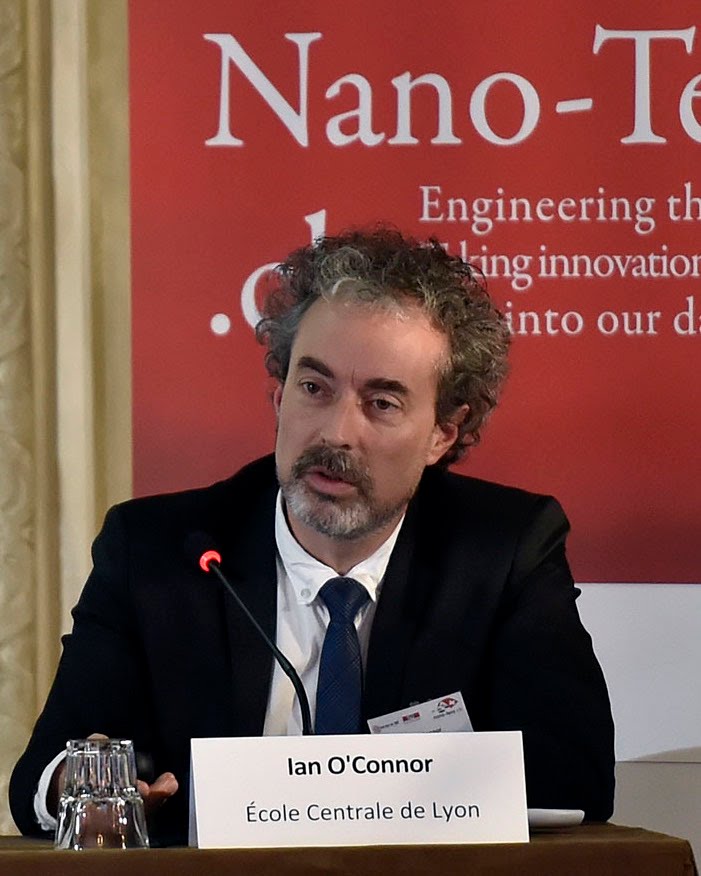DATE 2021 - Call for Papers
Table of Content
- The Conference
- The Exhibition
- Topic Areas for Submission
- Committees
- Sponsors
- Information
- Submission Instructions
- Scientific Papers for Oral Presentation
- Scientific Papers for Interactive Presentations
- Industrial Experiences Brief Papers
- Special Sessions
- Special Initiative "Autonomous Systems Design"
- Monday Tutorials
- PhD Forum
- University Booth
- Multi-Partner Innovative Research Projects
- Exhibition Theatre
- Friday Workshops
- Fringe Meetings
- Young People Program - Career Fair
The accepted papers of DATE 2021 are listed at https://www.date-conference.com/accepted.
Submission Key Dates
| Submission Instructions | Deadline |
|---|---|
| Camera-ready paper due date | |
| Young People Program: Student preregistration is closing | Friday, 15 January 2021 AoE |
| Young People Program: Student final upload date | Friday, 22 January 2021 AoE |
| Young People Program: Company final submission date | Monday, 18 January 2021 AoE |
Kindly note that all deadlines are strict and no extensions can be given.
The 24th DATE conference and exhibition is the main European event bringing together designers and design automation users, researchers and vendors, as well as specialists in the design, test and manufacturing of electronic circuits and systems hardware and software. DATE puts a strong emphasis on both technology and systems, covering ICs/SoCs, reconfigurable hardware and embedded systems, as well as embedded software.
The five-day event consists of a conference with plenary invited papers, regular papers, panels, hot-topic sessions, tutorials, workshops, special focus days and a track for executives. The scientific conference is complemented by a commercial exhibition showing the state-of-the-art in design and test tools, methodologies, IP and design services, reconfigurable and other hardware platforms, embedded software and (industrial) design experiences from different application domains, such as automotive, wireless, telecom and multimedia applications. The organisation of user group meetings, fringe meetings, a university booth, a PhD forum, vendor presentations and social events offers a wide variety of extra opportunities to meet and exchange information on relevant issues for the design automation, design and test communities. Special space will also be allocated for EU-funded projects to show their results.
The Conference
The conference addresses all aspects of research into technologies for electronic and (embedded) systems engineering. It covers the design process, test, and tools for design automation of electronic products ranging from integrated circuits to distributed large-scale systems. This includes both hardware and embedded software design issues. The conference scope also includes the elaboration of design requirements and new architectures for challenging application fields such as sustainable computing, Internet of Everything, security, healthcare and automotive systems. Persons involved in innovative industrial designs are particularly encouraged to submit papers to foster feedback from design to research. Panels, hot-topic sessions and embedded tutorials highlight and inform about emerging topics.
Special Days in the programme will focus on two areas bringing new challenges to the system design community:
Cyber-Physical Systems for I4.0 and Smart Industrial Processes: As an extension of traditional embedded systems, cyber-physical systems (CPS) combine deeply intertwined physical and software components to build sensor- based, communication-enabled autonomous systems. Nowadays, CPS represent the key enabling technology for the implementation of the Industry 4.0 (I4.0) paradigm in production systems for automotive and industrial applications, networks of consumer smart home and robotics applications, systems of systems applications for transportation and autonomous driving. This DATE Special Day will focus specifically on the use of CPS as enablers for the adoption of tools such as Digital Twins, Artificial Intelligence, Machine Learning and Data Analytics to improve the effectiveness of modern industrial processes. Specific requirements for CPS-related sensors, as well as the trends in multi-domain simulation, expanding the scope of EDA into Technical Software Markets will also be addressed.
Sustainable High Performance Computing: With forecasts arguing that by the end of the decade one fifth of global electricity consumption could be consumed by datacenters alone, charting a path towards sustainable high performance computing is of utmost importance. Emerging workloads such as data science and AI are rapidly becoming mainstream in many areas and are calling for even more performance across the board. While incremental gains in energy efficiency are observed, current technologies and practices alone are unlikely to enable orders-of-magnitude gains in energy efficiency. Shaping a sustainable high-performance IT landscape therefore requires thinking outside the box, towards holistic multidisciplinary approaches having carbon-footprint capping as a central motivation, thereby performing much wiser use of multiple energy sources, accounting for their corresponding carbon emissions. The special day on Sustainable High Performance Computing will report recent advances through technical and industrial sessions, tutorials and keynotes on the many aspects discussed above. Expected topics include (not limited to) energy and performance oriented heterogeneous and manycore architectures, hardware acceleration, emerging memory technologies, adaptive runtime systems and programming models, exascale-ready application design (scientific, AI, etc.), datacenter-level design and energy optimisation techniques, energy delivery and management, cooling techniques, etc.
DATE 2021 will also host a timely Special Initiative on:
Autonomous Systems Design: Fueled by the progress of artificial intelligence, autonomous systems become more and more integral parts of many Internet-of-Things (IoT) and Cyber-Physical Systems (CPS) applications, such as automated driving, robotics, avionics and industrial automation. Autonomous systems are self-governed and self-adaptive systems that are designed to operate in an open and evolving environment that has not been completely defined at design time. This poses a unique challenge to the design and verification of dependable autonomous systems. The DATE Special Initiative on Autonomous Systems Design on Thursday and Friday will include peer-reviewed papers, invited contributions and interactive sessions addressing these challenges. More details and a specific call for contributions can be found online: https://www.date-conference.com/asd.
The Exhibition
The vibrant accompanying exhibition represents a unique networking opportunity for vendors of tools and services for hardware and embedded software for the design, development and test of Systems-on-Chip, IPs, Embedded Systems, ASICs, FPGAs and PCBs. Furthermore, it is the perfect venue for industries to meet university professors to foster their university programme and especially for PhD students to meet their future employers.
A full programme in the Exhibition Theatre will again combine presentations by exhibiting companies, best-practice reports by industry leaders on their latest design projects and selected conference special sessions.
The full list of participating exhibitors and sponsors including their company profiles can always be found online: https://www.date-conference.com/exhibitors-sponsors.
Topic Areas for Submission
Within the scope of the conference, the main areas of interest are organised in the following tracks. Submissions can be made to any of the track topics.
Track D: Design Methods and Tools, addresses design automation, design tools and hardware architectures for electronic and embedded systems. The emphasis is on methods, algorithms, and tools related to the use of computers in designing complete systems. The track’s focus includes significant improvements on existing design methods and tools as well as forward-looking approaches to model and design future system architectures, design flows, and environments.
This track is organised in the following topics:
- D1 System Specification and Modeling, Click here for details
- D2 System-Level Design Methodologies and High-Level Synthesis, Click here for details
- D3 System Simulation and Validation, Click here for details
- DT4 Design and Test for Analog and Mixed-Signal Circuits and Systems, and MEMS, Click here for details
- DT5 Design and Test of Hardware Security Primitives, Click here for details
- DT6 Design and Test of Secure Systems, Click here for details
- D7 Formal Methods and Verification, Click here for details
- D8 Network on Chip and Communication-Centric Design, Click here for details
- D9 Architectural and Microarchitectural Design, Click here for details
- D10 Low-power, Energy-efficient and Thermal-aware Design, Click here for details
- D11 Approximate Computing, Click here for details
- D12 Reconfigurable Systems, Click here for details
- D13 Logical and Physical Analysis and Design, Click here for details
- D14 Emerging Design Technologies for Future Computing, Click here for details
- D15 Emerging Design Technologies for Future Memories, Click here for details
Track A: Application Design, is devoted to the presentation and discussion of design experiences with a high degree of industrial relevance, real-world implementations, and applications of specific design and test methodologies. Contributions should illustrate innovative or record-breaking designs, which will provide viable solutions in tomorrow’s silicon, embedded systems, and large-scale systems. In topic A8, there is the opportunity to submit 2-page papers that expose industrial research and practice.
This track is organised in the following topics:
- A1 Power-efficient and Sustainable Computing, Click here for details
- A2 Smart Cities, Internet of Everything, Smart Consumer Electronics, Click here for details
- A3 Automotive Systems and Smart Energy Systems, Click here for details
- A4 Augmented Living and Personalized Healthcare, Click here for details
- A5 Secure Systems, Circuits, and Architectures, Click here for details
- A6 Self-adaptive and Learning Systems, Click here for details
- A7 Applications of Emerging Technologies, Click here for details
- A8 Industrial Experiences Brief Papers, Click here for details
Track T: Test and Dependability, covers all test, design-for-test, reliability, and designfor-robustness issues, at system-, chip-, circuit-, and device-level for both analogue and digital electronics. Topics of interest also include diagnosis, failure mode analysis, debug and post-silicon validation challenges, and test or fault injection methods addressing system security.
This track is organised in the following topics:
- T1 Modeling and Mitigation of Defects, Faults, Variability, and Reliability, Click here for details
- T2 Test Generation, Test Architectures, Design for Test, and Diagnosis, Click here for details
- T3 Dependability and System-Level Test, Click here for details
- DT4 Design and Test for Analog and Mixed-Signal Circuits and Systems, and MEMS, Click here for details
- DT5 Design and Test of Hardware Security Primitives, Click here for details
- DT6 Design and Test of Secure Systems, Click here for details
Track E: Embedded and Cyber-Physical Systems, is devoted to the modelling, analysis, design and deployment of embedded software or embedded/cyber-physical systems. Areas of interest include methods, tools, methodologies and development environments. Emphasis will also be on model-based design and verification, embedded software platforms, software compilation and integration, real-time systems, cyber-physical systems, networked systems, and dependable systems.
This track is organised in the following topics:
- E1 Embedded Software Architecture, Compilers and Tool Chains, Click here for details
- E2 Real-time, dependable and privacy-enhanced systems, Click here for details
- E3 Machine Learning Solutions for Embedded and Cyber-Physical Systems, Click here for details
- E4 Design Methodologies for Machine Learning Architectures, Click here for details
- E5 Design modeling and verification for embedded and cyber-physical systems, Click here for details
Committees
Click the links below for a full list of the executive and programme committee members:
Sponsors
The event is sponsored by the European Design and Automation Association, the Electronic System Design Alliance, the IEEE Council on Electronic Design Automation, the European Electronic Chips & Systems Design Initiative, the ACM Special Interest Group on Design Automation, and the Russian Academy of Sciences.
In cooperation with IEEE Computer Society Test Technology Technical Council (TTTC), IEEE Solid-State Circuits Society (SSCS) and International Federation for Information Processing (IFIP).
Information
 Conference Organisation | Conference Manager
Conference Organisation | Conference ManagerAnja Zeun, K.I.T. Group GmbH Dresden, DE
date
 kitdresden [dot] de (date[at]kitdresden[dot]de)
kitdresden [dot] de (date[at]kitdresden[dot]de)
 General Chair
General ChairFranco Fummi, Università di Verona, IT
franco [dot] fummi
 univr [dot] it (franco[dot]fummi[at]univr[dot]it)
univr [dot] it (franco[dot]fummi[at]univr[dot]it)
 Programme Chair | Track D | Design, Methods and Tools Chair
Programme Chair | Track D | Design, Methods and Tools ChairIan O'Connor, École Centrale de Lyon, FR
papers
 date-conference [dot] com (papers[at]date-conference[dot]com)
date-conference [dot] com (papers[at]date-conference[dot]com)
To receive the DATE 2021 newsletter you may subscribe to the mailing list at the website: https://www.date-conference.com/#block-simplenewssubscription.
Share this page on social media



